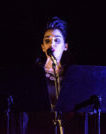Frontal Attack on Passivity
WEAVING POLITICS lecture review in ETC Magazine, by Alexander Alvina Chamberland
(English translation by Allan Nilsson)
 Politics and choreography were woven together at the conference Weaving Politics in Dansens Hus [“House of the Dance”] in Stockholm last December. Alexander Alvina Chamberland was there and listened to lectures and interviewed the vocal artist Diamanda Galás. Among the speakers at the Weaving Politics were the psychoanalytic feminist Julia Kristeva, Kendall Thomas and William Forsythe, creators of the production “Human Writes” and vocal artist Diamanda Galás. The lectures touched topics like postcolonialism in dance in Kenya, as well as in Gaza and the lives that are considered worthy to mourn. The topics were interesting, but the lectures tended to be academically rigid. This applied particularly to Julia Kristeva’s lecture on (trans) humanism, which held a high intellectual level, but unfortunately was within the two genders and a psychoanalytic generalized description of “youth” and “modern”. Kendall Thomas asked where transgender people fit into her analysis, and he got, as I perceived it, no straight answer. In his own speech Thomas talked about trans bodies in dance, which play a key role in breaking down gender stereotypes tyranny in the world of dance. He also pointed out how “Human Writes” questions the “mandatory beauty” associated with dance.
Politics and choreography were woven together at the conference Weaving Politics in Dansens Hus [“House of the Dance”] in Stockholm last December. Alexander Alvina Chamberland was there and listened to lectures and interviewed the vocal artist Diamanda Galás. Among the speakers at the Weaving Politics were the psychoanalytic feminist Julia Kristeva, Kendall Thomas and William Forsythe, creators of the production “Human Writes” and vocal artist Diamanda Galás. The lectures touched topics like postcolonialism in dance in Kenya, as well as in Gaza and the lives that are considered worthy to mourn. The topics were interesting, but the lectures tended to be academically rigid. This applied particularly to Julia Kristeva’s lecture on (trans) humanism, which held a high intellectual level, but unfortunately was within the two genders and a psychoanalytic generalized description of “youth” and “modern”. Kendall Thomas asked where transgender people fit into her analysis, and he got, as I perceived it, no straight answer. In his own speech Thomas talked about trans bodies in dance, which play a key role in breaking down gender stereotypes tyranny in the world of dance. He also pointed out how “Human Writes” questions the “mandatory beauty” associated with dance.
Makes Numbness Impossible
At the Conference Final day Diamanda Galás broke the academic pattern in a performance lecture that involved the entire body, including the brain. When I saw her live in Uppsala spring of 2011, she raised the bar for how transcending a performance can be. There and then she became the main inspiration to my own performance work. Galás’s voice is a frontal attack on passivity and voyeurism facing oppression and suffering. It forces us to be fully awake, makes numbness impossible and destroys all those who thought they could sit and cuddle inside the comfortable bubble of ignorance. The bubble bursts and either you escape it, or it stops you and you start to feel and act real. How will I manage to interview someone who means so much to me?
I begin by asking Diamanda how she handles mainstream venues. She says:
– When I started working, I wanted people who liked me to go to fancy places – a band of vampires to overthrow the places where the “elite meet.”
– When I get a chance to stand in the mainstream media, I make sure to infiltrate them with radical politics, she continues.
“The Radio Bans Silence”
Furthermore, we discuss the oppressed’s need for catharsis. Diamanda says that the word comes from the Greek word to “clean house and get on again” – an important process for many vulnerable people. We agree that most people who appreciate Diamanda Galás are people who have experienced real life: accordingly these people need a strong and deep work. Like the performance artist Penny Arcade, Galás says that the society’s perception that only young artists are interesting, shows how culture is viewed as a commodity, rather than a serious body of work. The conversation moves on to the difference between queer and mainstream gay, Diamanda describes the latter as “The school of interior design queens who idolize “perfect,” harmless artists.”
Finally, a few words of wisdom from Diamandas’ performance:
– I stand here with the hope that I will not get interrupted by someone who is bored, tired, or turned off.
– The radio bans silence. We are accompanied by a soundtrack of pop music when we go to the store, wherever we go … They hit you with a brick in the head so that you end up with a a brain like a tin can.
– The only cure for loneliness, is to be alone.
For a PDF of the article in ETC Magazine, click here.
allan nilsson



